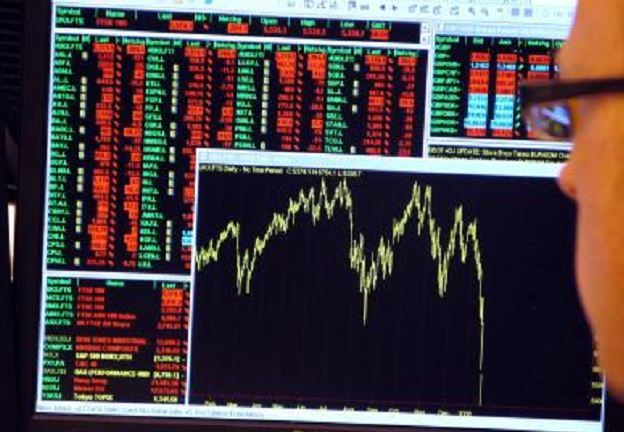
Almost every Middle Eastern stock index declined after oil, the region’s main source of income, sank to the lowest in seven years, damping the outlook for government spending.
Dubai’s DFM General Index ended its longest winning streak in almost three months. The gauge decreased 1.5 percent, the most in a week, to close at 3,026.05. Emirates NBD PJSC’s 4 percent retreat was the biggest contributor to the decline. The Tadawul All Share Index in Saudi Arabia lost 1.6 percent, also the most in seven days. The kingdom boosted its crude exports in October.
The retreats reflect the crunch countries in the Gulf are feeling as the plunge in oil curbs government revenue. Kuwait and Qatar said they will issue debt to cover rising budget deficits, even as bank liquidity is drying up and some central banks in the region raise borrowing costs in line with the Federal Reserve. The six-member Gulf Cooperation Council, which includes Saudi Arabia and the United Arab Emirates, is home to about 30 percent of the world’s oil. Saudi Arabia, the Arab world’s biggest economy, may announce next year’s budget this week.
“I don’t recommend buying anything in the market at the moment because oil hasn’t bottomed yet and global markets are still weak,” said Hisham Khairy, the Dubai-based head of institutional trade at Mena Corp. Financial Services LLC.
Brent crude, a pricing benchmark for half the world’s oil, dropped to $36.88 a barrel on Friday after a rise in the number of oil rigs in the U.S. signaled the supply glut that sent prices tumbling will be prolonged. The S&P 500 posted its biggest two-day drop in more than three months and the Stoxx 600 fell as investor concerns over global growth resurfaced.
A Bloomberg index of the leading 200 stocks in the region declined 1 percent on Monday, the most in a week.
Saudi Crude Exports
Saudi Arabia increased crude exports in October to the highest level in four months, as the world’s biggest oil exporter added barrels to a worldwide supply glut that has contributed to a slump in prices. Income from oil accounts for more than 80 percent of Saudi Arabia’s revenue.
Al Rajhi Bank, one of the world’s largest Islamic lenders, was the biggest contributor to the Tadawul’s decline. The shares fell 3.5 percent, the most since Oct. 1, as government deposits retreated this year.
The kingdom may announce its budget for 2016 on Monday, according to Nayal Khan, the Riyadh-based head of institutional equities sales trading at Saudi Fransi Capital.
“Given that the Saudi budget announcement is expected tomorrow, investors will either look to book short-term gains or simply remain on the sidelines until after the announcement,” Khan said by e-mail.
Dana’s Cash
Dana Gas PJSC was the most traded stock in Abu Dhabi after it said it will get 50 percent of its claims in a settlement with RWE AG. The Sharjah, U.A.E.-based energy producer is seeking to recover more than $1 billion in overdue payments from governments in Egypt and Iraq countries for fuel sales.
Dana Gas’s cash balance should jump more than $500 million within the next one-to-three months, and it may be debt free within the next six-to-12 months, Ghassan Chehayeb, chief investment officer at Texas-based Sancta Capital Group Ltd., said in e-mailed comments.
The equity rose 11 percent, the most since Nov. 29, to 50 fils. The company is one of eight gainers on Abu Dhabi’s ADX General Index, which rose 0.2 percent.
Kuwait’s SE Price Index slipped 0.9 percent to the lowest level since July 2004. The government will proceed with plans to privatize the exchange in April, selling a stake to Kuwaiti and foreign institutions.
Bahrain’s gauge retreated 0.2 percent to the weakest level in more than two years. Oman’s MSM 30 Index decreased 0.1 percent. Qatar’s stock market was closed for a public holiday.
Regaining Lost Allure
Egypt’s benchmark EGX 30 Index rose 0.6 percent, its fifth day of gains, matching its longest winning streak since October. Commercial International Bank Egypt SAE led gains with a 2 percent increase. The country’s biggest publicly-traded lender said Thursday it will allow a company controlled by billionaire Naguib Sawiris to conduct due diligence on its investment banking unit after receiving a buyout offer of about 1 billion Egyptian pounds ($128 million).
“When a savvy investor such as Sawiris is buying local investment banks, it shows the industry may be regaining some of its lost allure,” said Wafik Dawood, a portfolio manager at Cairo-based Compass Capital. “It’s a positive signal for investors, especially for foreigners.”
Restoring Turkey Relations
Israel’s TA-25 Index declined 1.9 percent at 3:08 p.m. in Tel Aviv, the most in a week. Gas explorers bucked the trend, advancing on bets the approval of the nation’s natural gas policy and the warming of relations with Turkey will pave the way for export deals from its large offshore reserves. The TA- Oil & Gas Index climbed 0.9 percent.
“The passing of the gas framework and the reports of a preliminary accord with Turkey are pushing up the gas shares,” said Yehonatan Shohat, an analyst at Leader Capital Markets Ltd. in Tel Aviv. “The ball is now in the hands of the oil and gas explorers who can now start finalizing export contracts.”
The government’s debt due August 2025 gained on Sunday as the yield dropped four basis points to 2.09 percent, the lowest level since Nov. 26 on a closing basis.